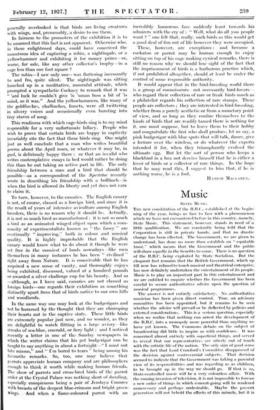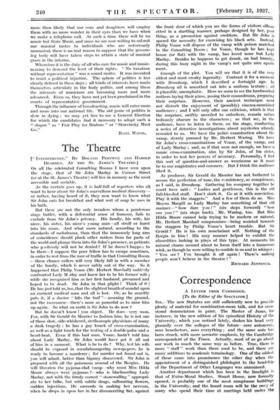M us ic STATE Ws W.
TILE new constitution of the B.B.C., established at. the begin- ning of the year, brings us face to face with at phenomenon which we have not encountered before in this country, namely, State Music. This statement, however, stands in need of a little qualification. We are constantly being told that the Corporation is still in private hands, and that no drastic change has been effected. The Government, we are given to understand, has done no more than establish an " equitable trust," which means that the Government and the public will share equally in the benefits to come. There is no question of the B.B.C. being exploited by State Socialism. But the eloquent fact remains that the British Government, which up till now has refused to touch musical and theatrical enterprise, has now definitely undertaken the entertainment of its people. Music is to play an important part in this entertainment and we are entitled to enquire whether the Government has been careful to secure authoritative advice upon the question of
usical programmes.
The answer is not entirely satisfactory. No authoritative musician has been given direct control. True, an advisory committee has been appointed, but it remains to be• seen whether the advice will prevail-or be deflected by policies and external considerations. This is a serious question, especially when we realize that nothing can arrest the development of the B.B.C. into a monopoly more powerful than anything we have yet known. The Commons debate on the subject of broadcasting did little to inspire us with confidence. It was concerned almost entirely with superficial things, and served to reveal that our representatives are utterly out of touch with the artistic life of the nation. The only sign of good sense was the fact that Lord Crawford's Conunittee disapproved of the decision against controversial subjects. That decision seemed to indicate that the Government was taking a parental view of its responsibilities and was regarding us as children, to be brought up in the way we should go. If that is so, State-controlled music will be a very colourless affair. With the coming invasion of television, it is not impossible to foresee a new order of things in which concert-going will be rendered unnecessary and perhaps undesirable. Maybe the present generation will not behold the effects of this miracle, but it is
more than likely that our sons and daughters will employ them with no more wonder in their eyes than we have when we make a telephone call. At such a time there will be no music but State Music, and since we are now willing to submit our musical tastes to individuals who are notoriously unmusical, there is no real reason to suppose that the govern- ing body will have taken steps to attain a state of musical grace in the interim.
Wherefore it is the duty of all who care for music and music- making to demand the least of their rights. " No taxation without representation " was a sound motto. It was invented to resist a political injustice. The sphere of politics is less clearly defined in these days ; all kinds of interests have made themselves articulate in the body politic, and among these the interests of musicians are becoming more and more advanced. Even so, they have not yet been proclaimed in the courts of representative government.
Through the influence of broadcasting, music will enter more and more into our national life. The old game of politics is slow in dying ; we may yet live to see a General Election for which the candidates fmd it necessary to adopt such a " slogan " as Fair Play for Brahms " or " Stravinsky Must Go."
BASIL MAINE.











































 Previous page
Previous page